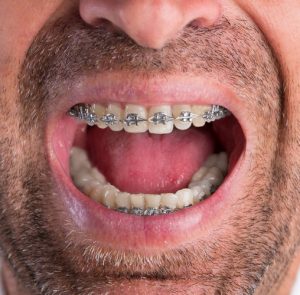Sometimes You Need Braces: Adjusting to Change
I recently got dental braces. (Read more about making that choice as an adult here). One surprising benefit is that braces offer all sorts of metaphors about making changes in your life. As a counselor, the more metaphors the better. So here goes.
You start your journey with braces with a problem and a desire. Your teeth aren’t straight and you want them to be. But to get there, you will have to submit to a long, slow process. You have to put up with small discomforts and inconvenience. You must be patient, this is all delayed gratification, the change is so gradual you can’t see it happen. But you want it, so you swallow hard and choose to start.
 Enter the friendly Orthodontist. You’ll have to open up. All that crookedness that you’ve been trying to hide is the very thing the orthodontist wants to see. They stare into your mouth; they actually take measurements of your shame. Then pictures. You’ll have to open up. They discuss your crookedness with their assistants, who nod seriously and take notes. They bring out a tray of stainless steel grommets. You catch on that they actually want to glue these sharp-looking objects onto your teeth. Then they thread a wire through your crowded arch to exert continual pressure. “This won’t take too long,” they tell you, “But while we do it, you’ll have to open up.”
Enter the friendly Orthodontist. You’ll have to open up. All that crookedness that you’ve been trying to hide is the very thing the orthodontist wants to see. They stare into your mouth; they actually take measurements of your shame. Then pictures. You’ll have to open up. They discuss your crookedness with their assistants, who nod seriously and take notes. They bring out a tray of stainless steel grommets. You catch on that they actually want to glue these sharp-looking objects onto your teeth. Then they thread a wire through your crowded arch to exert continual pressure. “This won’t take too long,” they tell you, “But while we do it, you’ll have to open up.”
Soon you walk out with a list of foods to avoid in your hand and an odd torque in your mouth. You remember that they said something about 18 months. When I walked out, I entered 549 days into my phone’s countdown app. The next day I checked it, and was shocked that only 24 hours had gone by. The same thing happened the next day, and I realized that, yes, this was going to take a while.
The best and the worse thing about braces is that once you put them on – you can’t just take them off. This is bad, in that they pull on you, causing your bite pattern to shift so that you leave lunch with about half of it still lodged somewhere in your palette. You want to take the darn things off when they hurt, inhibit a satisfying chew or you just want to smile. But then, if you took them off, then your teeth wouldn’t improve.
And you would take them off. For just a minute at first, just long enough to eat. Then you’d forget to put them back on and a day would go by. Then a week. Pretty soon the 549 days is 849 and then the whole thing just takes too long and you just forget the whole attempt. That’s what happens when we want to change other things, doesn’t it? You want to lose weight and you do good for a few days, then you take the ‘rules’ off – just for a minute. Then a day. Before you know it, it’s been too long and you forfeit the whole attempt.
So the worst thing about braces is also the best thing – you can’t take them off.
They work for you, even when you don’t want them too. They slowly help you. Even at night – there is this slow, steady pull of progress in your mouth. But in order for this to happen, you have to open up to discipline. Think of the braces as a set of rules. Think of the wire as a guideline. They are often inconvenient, often cumbersome, but they help you go someplace you want to go. And because you are committed to them (the glue), they will take you there even when you wouldn’t daily choose to go there yourself.
Sometimes we need braces. We need them because though we might be strong enough to name a problem and have a desire, we are not so strong on a daily basis. ‘The Spirit is willing, but the flesh is weak.’ Our ‘commitment’ to ‘braces’ helps us through. But this isn’t just true for dental work. We need to commit to all sorts of ‘braces’ for slow, incremental, changes like; improving our health, kicking an addiction, repenting of a besetting sin, staying organized or adding a fruit of the Spirit to our character.
Yes, sometimes we need braces. They come to us in all sorts of ways. For example, we need written commitments to ourselves that we review and track. We need friends to check in, support and hold us accountable. We need groups like F3 or life groups who remind us of what is truly good for us. We need daily practices that help up pace ourselves for slow change. We need the Spirit to help us know that we aren’t alone.
Sometimes we need braces to help us grow where we want to grow. But you’ll have to open up.
 Roger Edwards joined The Barnabas Center in 1991. He works with both with individuals and couples, helping people confess their need and embrace their available choices to lead healthier lives. Roger also teaches and leads discussion groups and retreats applying the Gospel to everyday life. He is a licensed professional counselor (LPC), holds a master’s degree in biblical counseling from Grace Theological Seminary in Indiana and earned a bachelor’s degree in engineering from the University of North Carolina at Charlotte. He is married to Jean and they have seven children and nine grandchildren.
Roger Edwards joined The Barnabas Center in 1991. He works with both with individuals and couples, helping people confess their need and embrace their available choices to lead healthier lives. Roger also teaches and leads discussion groups and retreats applying the Gospel to everyday life. He is a licensed professional counselor (LPC), holds a master’s degree in biblical counseling from Grace Theological Seminary in Indiana and earned a bachelor’s degree in engineering from the University of North Carolina at Charlotte. He is married to Jean and they have seven children and nine grandchildren.
Save
Save
Save
Save
Save
Save
Save
Save







